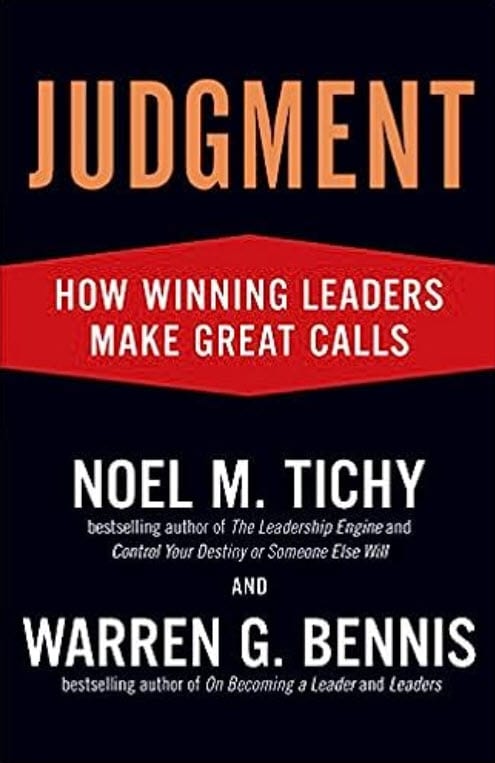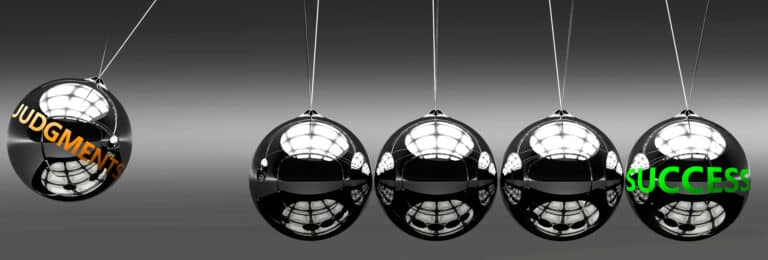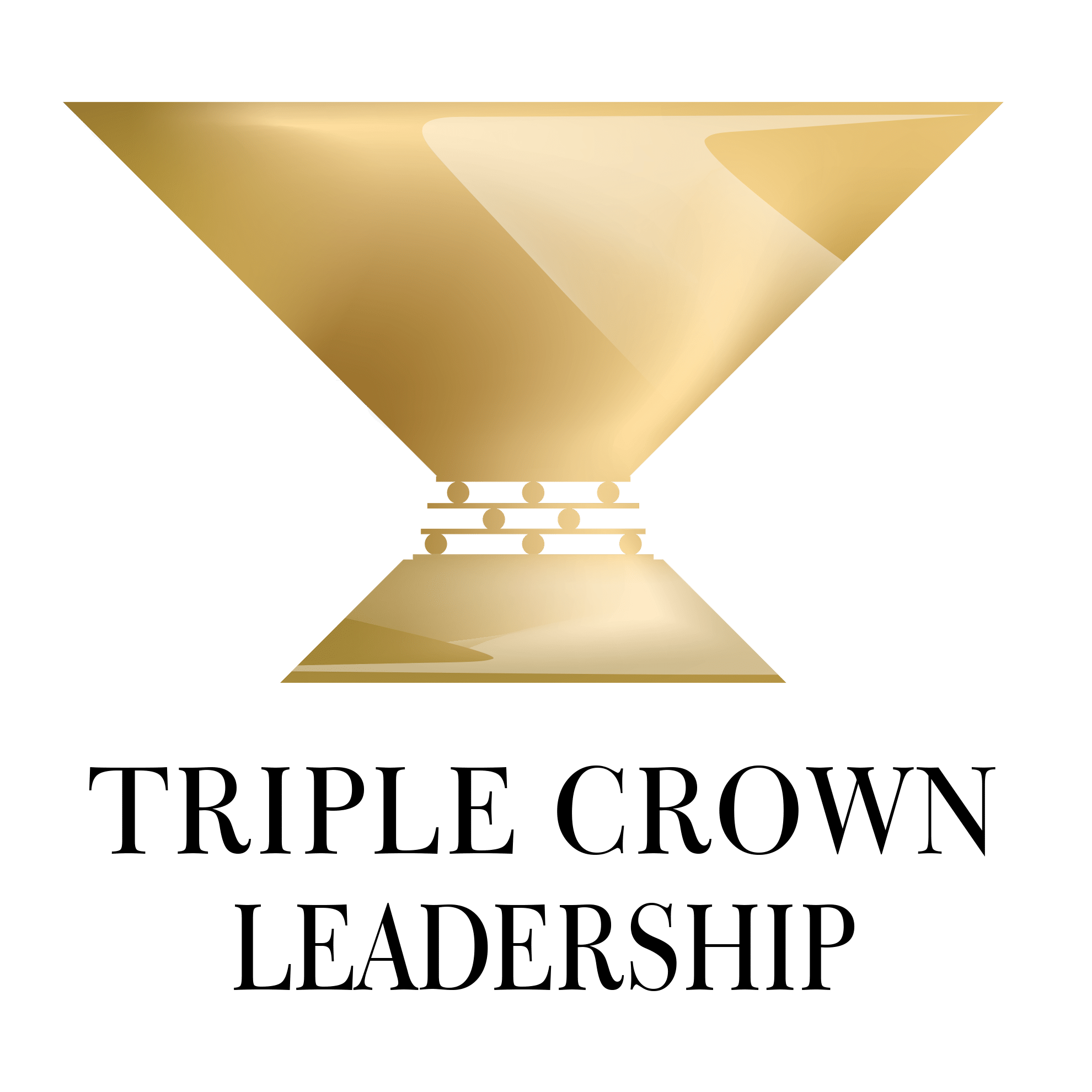Summary:
Judgment is an essential leadership quality. We outline why some leaders make bad judgments and how to develop good judgment.
+++
Judgment is the ability to make good decisions. It’s a complex phenomenon requiring the ability to observe and understand things, draw upon knowledge and experience, form an opinion, and reach a decision. It entails discerning, comparing, and making considered decisions.
Decision-making takes place in the frontal lobes of our brains which are responsible for “executive function.” That includes attention, reasoning, judgment, problem solving, creativity, emotional regulation, impulse control, and awareness of the aspects of our own and others’ functioning.
Leaders make many decisions every day, from the trivial to the monumental, from what to have for lunch to who to hire and promote and which markets to enter. These decisions are important in determining whether their people, teams, and organizations operate effectively.
Many leaders struggle with indecisiveness, analysis paralysis, or “choice anxiety,” or perfectionism. In today’s world of information overload, fake news, conspiracy theories, and more, developing good judgment and making good decisions can be challenging.

Leadership Derailers Assessment
Take this assessment to identify what’s inhibiting your leadership effectiveness. It will help you develop self-awareness and identify ways to improve your leadership.
Bad Judgments All Around Us
Examples of bad judgment abound, from lacking enough lifeboats on the Titanic to so many publishers rejecting J.K. Rowling’s Harry Potter book proposal to Kodak’s decision to focus on traditional film after inventing the digital camera.
Think about Microsoft dismissing the threat of the iPhone when it was new. Or Alta Vista rejecting the offer to purchase Google’s search patent for $1 million during its startup years—with Yahoo and Excite following suit. Oops.
Think about the bad judgment exhibited at Enron, Theranos, Tyco, Wells Fargo, and WorldCom—with all the devastating consequences.
According to a McKinsey Global Survey, only 20 percent of respondents say their organizations excel at decision making. What’s more, a majority report that they use much of the time they devote to decision making ineffectively.
Choosing between good and bad options is easy. The hard judgment calls come into play when there are only alternatives with bad consequences—or when information and data are missing and there are no obvious choices. Difficult decisions have subtle nuances that many people miss. Sometimes leaders have to make decisions that are well outside their domain of expertise and experience set.
“If you were omniscient and had a time machine, you would know everything you need to know about the [the results of your decision], but the problem is that we don’t have either of those things, so we don’t have perfect information when we’re making a decision.”
-Annie Duke, author

The Process of Developing Judgment
In their excellent book, Judgment: How Winning Leaders Make Great Calls, leadership experts Noel Tichy and Warren Bennis write:
“The single most important thing that leaders do is make good judgment calls.…
The cumulative effect of leaders’ judgment calls determines the success or failure of their organization.”

They note that good judgment calls are a process, not an event. The process has three phases: preparation (sensing and framing the issue and communicating why the decision is important), the call (the decision), and execution of the decision (while learning and adjusting along the way). They point out that most of a leader’s important decisions exist in three domains: people (hiring and placing the right people and developing them), strategy, and crisis.
According to Tichy and Bennis, the judgment calls in leadership decision-making have both rational and emotional aspects. To have good judgment, a leader needs knowledge of him or herself, the people with whom to consult, how their organization operates, and the context of the judgment call, specifically the impacted stakeholders.

Personal Values Exercise
Complete this exercise to identify your personal values. It will help you develop self-awareness, including clarity about what’s most important to you in life and work, and serve as a safe harbor for you to return to when things are tough.
Factors Leading to Bad Judgment
There are many factors causing leaders to make bad judgment calls. Here are 17 common ones:
- Framing the wrong issue
- Failing to face reality
- Being reactive or emotional
- Letting ego and self-image drive decisions
- Being ideological or narrow-minded
- Feeling stressed
- Listening to people with a one-sided agenda or bad actors
- Being too short-term or too long-term oriented
- Having blind spots about people
- Remaining stuck in an old paradigm
- Confusing hope with sound judgment
- Being greedy or overly concerned about power and status
- Defaulting to simple solutions without examining alternatives
- Being indecisive
- Being fearful of criticism, defiance, or failure
- Lacking the courage to do what’s right or to take calculated risks
- Being sleep-deprived or impaired by alcohol or drugs
Reflection Question:
What other factors cause leaders to make bad judgment calls?
Factors Leading to Good Judgment
There are many factors causing leaders to develop good judgment. As you review the list below, note which ones need work in your current work setting.
- Having relevant knowledge and experience as well as an open mind
- Considering the organization’s shared purpose, values, and vision when making decisions
- Having character, values, and a moral compass
- Not acting emotionally or with knee-jerk reactions
- Being aware of your personal biases
- Defining the right problem and clear goals
- Being open-minded to the input of trusted colleagues with good character
- Seeking the views of stakeholders impacted by the decision
- Sorting through complexity to get to the essence of the issue at hand
- Exploring and balancing the pros and cons
- Being willing to think outside the box and consider radical alternatives
- Anticipating likely impacts as well as potential unexpected consequences
- Seeking input from people with a diversity of backgrounds and opinions
- Getting input from people willing to play the “devil’s advocate” (challenging ideas to provoke debate or test the strength of arguments) or to challenge authority
- Stepping back to gain perspective (leadership authors Ronald Heifetz and Marty Linsky use the metaphor of “spending time on the balcony” rather than the dance floor of daily work)
- Having the courage to do what’s right
- Avoiding confirmation bias, groupthink, and other cognitive biases that derail good decision-making
- Balancing the team with diversity and different viewpoints (according to Amazon’s leadership principles, leaders should “seek diverse perspectives and work to disconfirm their beliefs”)
- Creating a team culture that welcomes and even rewards tough questions, rigorous debate, and conscientious exploration of options, including “psychological safety”
- Questioning the ideas proposed—and not always accepting the initial options proposed
- Factoring in the feasibility of executing the ideas and plans under consideration
- Distinguishing between irreversible and reversible decisions (Jeff Bezos wrote about this in his 2015 letter to shareholders with the distinction between one-way doors, where there’s no going back, and two-way doors in which you can simply “reopen the door and go back through.” He lamented that too many big companies use one-size-fits-all decision making, treating all decisions like one-way doors, in the process slowing everything down.)
- Considering whether there’s more information readily available that would be important for making a good decision—or not—and gauging whether we have enough of the right kind of information to decide
- Invoking our intuitive sense (gut instincts) as well as our reason and logic when making important decisions
- Distancing ourselves from the situation (e.g., projecting forward decades into the future and thinking about which choice will serve us the best over time)
- Looking for innovation solutions such as creative combinations or trials
- Determining which decisions require a thorough vetting process
Leaders are wise to find sanctuary—places and practices of peace and centering—when making important decisions.
Organizations can also work on developing good decision-making skills, decisiveness, and judgment in their leadership development and training programs.
Reflection Question:
What other factors cause leaders to develop good judgment?
Decisions and Timing
Making good decisions is also a matter of timing. When we have time, we can get input, assess pros and cons, appoint devil’s advocates, consider unexpected consequences, generate many out-of-box alternatives, and more.
But when we don’t have time, we have to rely on our moral compass, our instincts, and our experience.

Alignment Scorecard
When organizations aren’t aligned, it can reduce performance dramatically and cause frustration and dysfunction. With this Alignment Scorecard, you can assess your organization’s level of alignment and make plans for improving it.
Conclusion
Good leadership requires good judgment. The most important elements of good judgment are experience, a good moral compass, and, when possible, getting the counsel of trusted colleagues with good character.
If leaders can get good at developing good judgment and making good decisions, it will help them with everything they do. There’s incredible leverage that comes from developing good judgment.
Reflection Questions
- Are you satisfied with your leadership judgment?
- What could you work on to improve your judgment?
- Could you improve your judgment by working on some of the qualities of good decision-making cited above?
Tools for You
- Leadership Derailers Assessment to help you identify what’s inhibiting your leadership effectiveness
- Personal Values Exercise to help you determine and clarify what’s most important to you
- Alignment Scorecard to help you assess your organization’s level of alignment
Related Articles
- “Learn How to Trust Your Judgment“
- “How to Be More Decisive in Your Life and Leadership”
- “Ethical Decision-Making: Simple Tests”
- “How Ego and Pride Derail Leaders”
- “The Trap of Being Unrealistic”
- “Choice Overload”
- “The Trap of Self-Doubt—And How to Overcome It”
- “The Perfectionism Trap”
- “People-Pleasing: Why We Do It and How to Stop It”
Appendix: Decision-Making Aids for Leaders
The three techniques below can help leaders and teams make better decisions:
I. “Pre-Mortem” session: instead of doing a “post-mortem” review after the fact, in a “pre-mortem” a team imagines that a project or new venture has failed, and then works backward to determine what could lead to the failure. The pre-mortem is effective because it rewards people for creatively finding flaws in the current plan before it’s too late. (See this video of Daniel Kahneman explaining the pre-mortem.)
II. “Kill-Thrill” session: This approach has two stages:
- “Kill”: Brainstorm all the challenges with the idea or proposal and the reasons why the venture may not work. In other words, “kill” it with criticism.
- “Thrill”: Next, brainstorm ideas for how to make the venture idea work, addressing the problems or risks noted earlier. Bring it back from the dead.
(Merck has used a version of this Kill-Thrill exercise for a long time. Source: Alexander Osterwalder and Yves Pigneur, Business Model Generation, John Wiley and Sons.)
III. “Creative Abrasion”: In this approach, teams question each other and try to destroy each other’s ideas. Then they must articulate the other side of the argument. Such friendly duels can sharpen thinking and lead to innovation. (Bob Taylor used this technique successfully at Xerox’s Palo Alto Research Center in the development of the ARPAnet, the network that became the basis for the Internet. Source: Walter Isaacson, The Innovators, Simon & Schuster.)
Quotations by Noel Tichy and Warren Bennis on Judgment and Leadership
- “Good judgment is the essence of leadership.”
- “Making judgment calls is the essential job of a leader. With good judgment, little else matters. Without good judgment, nothing else matters.”
- “The single most important thing that leaders do is make good judgment calls.”
- “Long-term success is the sole marker of good judgment.”
- “The cumulative effect of leaders’ judgment calls determines the success or failure of their organization.”
- “It’s not how many calls a leader gets right. It’s how many of the important ones they get right.”
Other Quotations on Leadership and Judgment
- “Fortune truly helps those who are of good judgment.” -Euripides
- “If you can’t stand the heat, stay out of the kitchen.” -Harry Truman, former U.S. president
- “Leaders with good judgment tend to be good listeners and readers.” -Sir Andrew Likierman, professor, London Business School
- “We may think that our decisions are guided purely by logic and rationality, but our emotions always play a role in our good decision-making process.” -Salma Stockdale, author
- “Truly successful decision-making relies on a balance between deliberate and instinctive thinking.” -Malcolm Gladwell, author
- “Visionary decision-making happens at the intersection of intuition and logic.” -Paul O’Brien, actor
- “Decision making is the specific executive task.” -Peter Drucker, expert on management and innovation
- “Decision making is easy when your values are clear.” -Roy Disney
- “It is in your moments of decision that your destiny is shaped.” -Tony Robbins
Resources on Judgment and Decision-Making
- Noel Tichy and Warren Bennis, Judgment: How Winning Leaders Make Great Calls
- Alliance for Decision Education
- Annie Duke, How to Decide: Simple Tools for Making Better Choices
- Barry Schwartz, The Paradox of Choice: Why More Is Less
- “Barry Schwartz: The Paradox of Choice” TED talk
- Chip and Dan Heath, Decisive: How to Make Better Choices in Life and Work
- John Hammond, Ralph Keeney, and Howard Raiffa, Smart Choices: A Practical Guide to Making Better Decisions

Triple Crown Leadership Newsletter
Join our community. Sign up now and get our monthly inspirations (new articles, announcements, opportunities, resources, and more). Welcome!
+++++++++++++++++++++++
Gregg Vanourek and Bob Vanourek are leadership practitioners, teachers, and award-winning authors (and son and father). They are co-authors of Triple Crown Leadership: Building Excellent, Ethical, and Enduring Organizations, a winner of the International Book Awards. Check out their Leadership Derailers Assessment or get their monthly newsletter. If you found value in this, please forward it to a friend. Every little bit helps!


